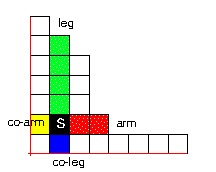| BACK TO: |
|
Definitions of Symbols used in this Website |
An excellent general reference (and essentially the bible for research in this area) for symmetric functions is the book Symmetric Functions and Hall Polynomials by I.G. Macdonald, Oxford Science Publications, Second Edition 1995. There are other references for symmetric functions, Segan

| Define an inner product The Schur symmetric functions have the property that they are upper
triangularly related to the monomial symmetric functions and orthogonal
with respect to the |
Define an inner product  .
This is usually referred to as the Hall-Littlewood scalar product. .
This is usually referred to as the Hall-Littlewood scalar product.
Define the symmetric functions |
| Define another inner product
This is the Macadonald inner product or the q,t-inner product. |
|
The Macdonald symmetric functions Pmu(X,q,t) are defined by the property
that they are upper triangularly related to the monomial symmetric functions
and orthogonal with respect to the
|
| Let
|
| Define |
| Define the basis |
| The Hall-Littlewood symmetric functions that appear here are transformed
from the standard symmetric functions. They are given by the formula |
| Occasionally, plethystic notation is used for symmetric functions here.
This is a notational device for expressing the substitution of the monomials
of one expression, $E = E(t_1, t_2, t_3, \ldots)$ for the variables of
a symmetric function, $P$. The result will be denoted by $P[E]$ and represents
the expression found by expanding $P$ in terms of the power symmetric functions
and then substituting for $p_k$ the expression $E(t_1^k, t_2^k, t_3^k,
\ldots)$.
More precisely, if the power sum expansion of the symmetric function $P$ is given by $$P = \sum_\la c_\la p_\la$$ then the $P[E]$ is given by the formula $$P[E] = \sum_\la c_\la p_\la \coeff_{p_k \rightarrow E(t_1^k, t_2^k, t_3^k, \ldots)}$$. To express a symmetric function in a single set of variables $x_1, x_2, \ldots, x_n$, let $X_n = x_1 + x_2 + \cdots + x_n$. The expression $P[X_n]$ represents the symmetric function $P$ evaluated at the variables $x_1, x_2, \ldots, x_n$ since $$P(x_1, x_2, \ldots, x_n) = \sum_\la c_\la p_\la \coeff_{p_k \rightarrow x_1^k + x_2^k + \cdots + x_n^k} = P[X_n]$$ |